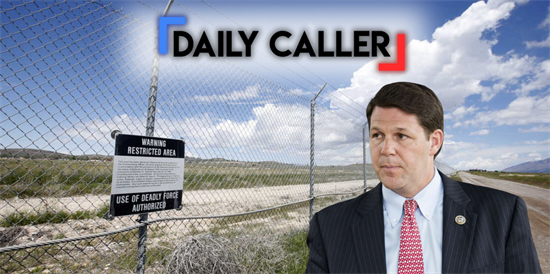EXCLUSIVE: GOP Rep Unveils Bill To Secure US Military Bases From Foreign ‘Land Grabs’
By Ireland Owens
April 9, 2025
AS SEEN IN THE DAILY CALLER
Republican Texas Rep. Jodey Arrington introduced a bill Wednesday aiming to prohibit individuals acting on behalf of Russia, China, Iran and North Korea from purchasing U.S. property located near military installations.
The bill, titled the Protecting Military Installations and Ranges Act, would empower the Committee on Foreign Investment in the U.S. (CFIUS) to review real estate investments in the U.S. by entities affiliated with China, Russia, Iran, or North Korea, according to the legislation’s text first obtained by the Daily Caller News Foundation. The law would apply to real estate purchases located within 100 miles of a military installation or 50 miles of a military training route, special use airspace, controlled firing area, or military operations area.
The CFIUS is a committee authorized to review certain transactions involving foreign investment in the U.S. and certain real estate transactions by foreign individuals, in order to determine the impacts of such transactions on U.S. national security, according to its website.
“It is supremely naïve and dangerous to allow foreign actors affiliated with our greatest adversaries to purchase land next to U.S. military installations,” Arrington told the DCNF.
The legislation would also prohibit the Department of Defense (DOD) and the Department of Transportation (DOT) from issuing final determinations regarding specified projects that involve a real estate transaction under review by the CFIUS until it has concluded its review.
“I’m proud to lead this common sense cause to prevent these dangerous land grabs that threaten our national security and the safety of my fellow Americans,” Arrington said.
Notably, there have been mounting concerns in recent years that the increasing amount of foreign individuals and entities investing in American land could pose massive risks to U.S. national security. One major potential national security risk is foreign adversaries such as China purchasing farm land near U.S. military installations, according to a report from the Government Accountability Office released in January 2024.
Foreign persons held an interest in nearly 45 million acres of U.S. agricultural land as of December 2023, which accounted for 3.5% of all privately held agricultural land and 2% of all land in the U.S., according to estimates from the U.S. Department of Agriculture (USDA). Chinese primary investor filers reported owning 277,336 acres of U.S. agricultural land as of December 2023, while Iranian filers reported owning 3,030 acres. No acres were owned by North Korea filers, while Russian investors reported 11 acres, according to the USDA.
In January, Republican Texas Sen. Ted Cruz introduced companion legislation in the Senate, called the Protecting Military Installations and Ranges Act, which similarly aims to protect DOD installations and training areas from foreign adversaries, and also restricts the purchase of certain property by a foreign persons acting for or on behalf of Russia, China, Iran, or North Korea.
Similarly, Republican South Dakota Sen. Mike Rounds and Republican Nevada Sen. Catherine Cortez Masto reintroduced in March the Promoting Agriculture Safeguards and Security Act, which is a bill aiming to ban individuals and entities controlled by China, Russia, Iran and North Korea from purchasing agricultural land and businesses located near U.S. military installations or “sensitive sites.”



